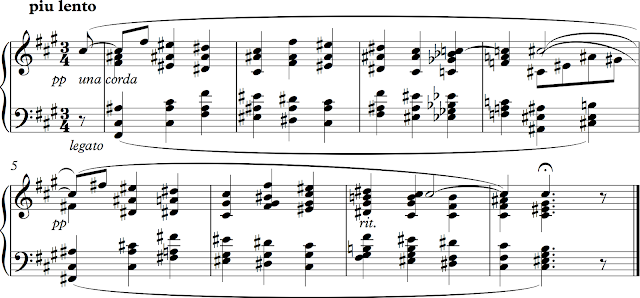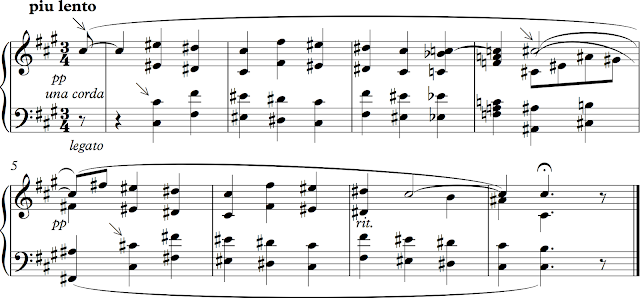 |
| Brahms at about the time of Opus 118 |
 |
| Brahms Intermezzo Op 118, No. 2 (Double click image to enlarge.) |
It's one thing to think in terms of featuring the soprano line, located as it so often is in the fifth finger. (There are those of us who ponder whether God actually meant us to play the piano, having put all of those luscious melody notes in that tiny appendage.) If we always feature the soprano, we would probably be more often correct than incorrect. However, in this case there is more going on that met my student's eye. Do you see the canon with the tenor voice in the left-hand thumb?
 |
| Brahms Intermezzo Op. 118, No. 2 Canon (Double click image to enlarge.) |
Our job as pianist's—as musicians—is to first show what's there and then what's different. This passage functions as a transition to the return of the "A" material. But isn't it more than just a transition? Using the material of the previous eight bars, a section of subtle anxiety, Brahms takes us—now in F-sharp-major—to church and a moment of refuge before the greater storm emerges. What could be more liturgical than counterpoint? In this case, showing the canon gives us more than a singable hymn, and takes us not only to church but references an ancient time.
 |
| The chiroplast, a hand stretching apparatus similar to the one Robert Schumann may have used, causing irrevocable injury. |
As a matter of technique, though, do not suddenly become an organist. The poor organist doesn't have the advantage of a damper pedal, which more often than not results in a lot of stretching and pulling in an effort to sustain these chords. True, this is hymn-like, but I rather imagine a brass choir playing somewhere off the nave.
No comments:
Post a Comment